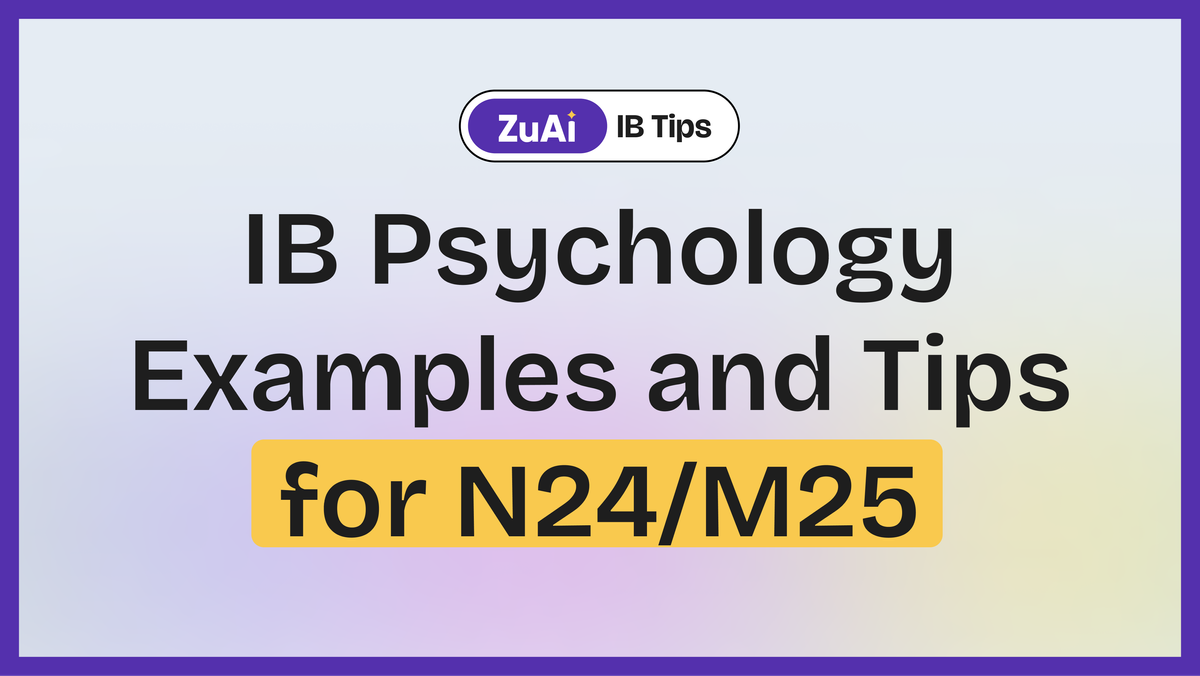What Makes a Great IB Psychology IA? Examples and Tips for N24/M25

Author: Lucy Harper, IB Psychology Teacher
Introduction
The IB Psychology Internal Assessment (IA), (IB Psychology Internal Assessment Guide) is a unique opportunity to explore a psychological concept that fascinates you. As an IB Psychology teacher, I’ve helped many students transform their ideas into top-scoring IAs. In this guide, I’ll share my tips on how you can create a great IA for the N24 and M25 sessions, complete with examples and answers to frequently asked questions.
Tip 1: Choose an Interesting and Relevant Topic
Your topic should not only capture your interest but also be relevant to the field of psychology. Whether it’s memory, social influence, or abnormal psychology, choose something that resonates with you and offers plenty of research opportunities.
Example: A compelling topic might be investigating how cognitive dissonance influences decision-making in teenagers. This allows you to explore a well-established theory in a specific, relatable context.
Tip 2: Plan Your Experiment Carefully
A well-planned experiment is the foundation of a successful IA. Your research question should be clear, your hypothesis testable, and your methodology robust.
Pro Tip: Reviewing IB Psychology IA examples can give you insights into how successful students have structured their experiments and presented their data.
Tip 3: Analyze Your Data Thoroughly
It’s not enough to simply collect data; you must analyze it critically. Discuss the implications of your findings, relate them to existing psychological theories, and consider any limitations in your study.
Bonus Tip: AI app for IB Exams = ZuAI
It's the ultimate AI app designed to help your child excel in their IB exams. As a parent, you want the best for your child, and so do we.
ZuAI provides personalized study support, practice questions, and detailed explanations tailored specifically to the IB curriculum.
Think of it as a smart tutor who understands your child’s unique learning needs, helping them tackle challenging subjects with confidence.
With ZuAI, you can feel reassured knowing your child is getting the extra help they need to succeed and build a bright future.
We genuinely care about your child's success and are here to support them every step of the way.

Looking for free solutions to previous year's question papers? Check out ZuAI's YouTube channel.
FAQ Section
Q1: How long should my IB Psychology IA be?
A: The IB Psychology IA should be between 1,800 and 2,200 words. This includes the introduction, method, results, discussion, and conclusion sections. Make sure to stay within this limit to ensure your IA is concise and focused.
Q2: What is the best way to choose a topic for my Psychology IA?
A: Choose a topic that genuinely interests you and has a strong foundation in psychological theory. Start by brainstorming areas of psychology you find fascinating, then narrow it down to a specific research question that can be explored through experimentation.
Q3: Can I use secondary data for my IB Psychology IA?
A: Yes, you can use secondary data, but primary data collection is often more rewarding and allows you to explore your research question more thoroughly. If you choose to use secondary data, ensure it’s reliable and relevant to your study.
Q4: How important is the ethical consideration in my IA?
A: Ethical considerations are crucial in your Psychology IA, especially if your study involves human participants. Ensure you obtain informed consent, maintain confidentiality, and minimize any potential harm to participants.
Q5: How should I structure the results section?
A: The results section should present your data clearly and logically, using tables, graphs, or charts where appropriate. Follow this with a detailed explanation of what the data shows in relation to your hypothesis.
Conclusion
Creating a great IB Psychology IA requires careful planning, thorough analysis, and a clear understanding of psychological theories. By choosing an engaging topic and executing your experiment with precision, you can produce an IA that not only meets but exceeds the IB’s expectations. Use the tips and answers to common questions provided in this guide to help you along the way. Good luck with your N24 and M25 IAs!
